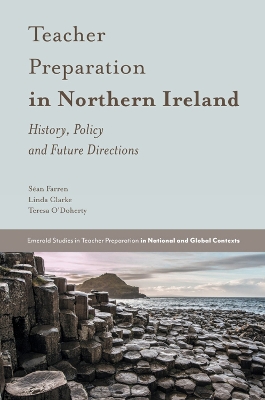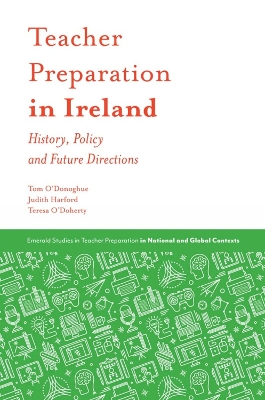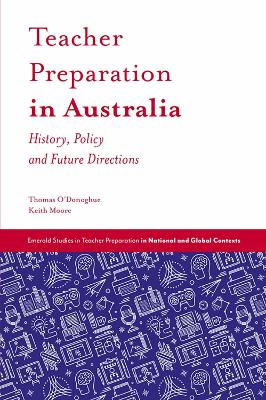Emerald Studies in Teacher Preparation in National and Global Contexts
3 total works
Teacher Preparation in Northern Ireland
by Sean Farren, Linda Clarke, and Teresa O'Doherty
Published 22 August 2019
The formation of Northern Ireland marked a sharp divergence in policy that had developed throughout the whole of Ireland in the preceding century. Local communal interests helped to drive and shape a unique model of teacher preparation.
Teacher Preparation in Northern Ireland examines teacher education across the first century of Northern Ireland’s existence and contextualises this within an account of teacher preparation in pre-partition Ireland. This timely book also looks at the more recent history of the region, with a focus on how infrastructural arrangements have continued to reflect wider divisions in Northern Irish society, whilst also considering how these divisions have been counterbalanced by efforts to bridge the rifts through greater cooperation around both policy and practice. By looking at contemporary developments within the wider historical context, this book will not only be an invaluable text for educationalists, historians and policy makers in Northern Ireland, but also to counterparts internationally and comparative educationalists.
Teacher Preparation in Northern Ireland examines teacher education across the first century of Northern Ireland’s existence and contextualises this within an account of teacher preparation in pre-partition Ireland. This timely book also looks at the more recent history of the region, with a focus on how infrastructural arrangements have continued to reflect wider divisions in Northern Irish society, whilst also considering how these divisions have been counterbalanced by efforts to bridge the rifts through greater cooperation around both policy and practice. By looking at contemporary developments within the wider historical context, this book will not only be an invaluable text for educationalists, historians and policy makers in Northern Ireland, but also to counterparts internationally and comparative educationalists.
Teacher Preparation in Ireland
by Thomas O'Donoghue, Judith Harford, and Teresa O'Doherty
Published 29 June 2017
Fifty years ago, in 1967, free education was introduced in Ireland for attendance at second-level schools and great expansion of provision of education at both this and third-level followed. Currently, great interest is developing in this landmark development in Irish history, which was probably the most significant initiative taken in regard to education in Ireland from Independence from Britain in 1922 to the present.
This book contributes to the interest generated by this landmark anniversary by tracing the history of teacher preparation in Ireland. It relates to the introduction to the ‘free education’ education scheme introduced in 1967, in that it provides an exposition on the nature of teacher preparation for teaching in primary and second-level schools both before and after the initiative was taken. Thus, it traces the history of teacher preparation through a number of stages; from education for nation-building in the new post-colonial society to partaking in the recent neo-liberal agenda sweeping through education systems throughout the world.
This book should be of interest not only to Irish educationists, historians and policy makers, but also to their counterparts internationally, as well as to comparative educationists. It can be seen as providing an exposition which can be used by teacher educators in many parts of the world which they can use to sharpen their perceptions of their own situations through comparison and contrast, provoke ideas for critical discussion, and stimulate them to come to an understanding of the importance of considering contemporary developments within their wider historical contexts.
This book contributes to the interest generated by this landmark anniversary by tracing the history of teacher preparation in Ireland. It relates to the introduction to the ‘free education’ education scheme introduced in 1967, in that it provides an exposition on the nature of teacher preparation for teaching in primary and second-level schools both before and after the initiative was taken. Thus, it traces the history of teacher preparation through a number of stages; from education for nation-building in the new post-colonial society to partaking in the recent neo-liberal agenda sweeping through education systems throughout the world.
This book should be of interest not only to Irish educationists, historians and policy makers, but also to their counterparts internationally, as well as to comparative educationists. It can be seen as providing an exposition which can be used by teacher educators in many parts of the world which they can use to sharpen their perceptions of their own situations through comparison and contrast, provoke ideas for critical discussion, and stimulate them to come to an understanding of the importance of considering contemporary developments within their wider historical contexts.
Teacher policy and practice in Australia has evolved substantially from the development of the first colony in 1788 to the present. This book traces the history of teacher preparation through five inter-related phases; the unregulated phase, the apprenticeship phase, the ascendancy of the Teachers Colleges, the ascendancy of the Colleges of Advanced Education, and the university dominated phase from 1989 to the present day. While the focus is primarily on preparation to teach in primary and secondary schools, this important text also sheds light on teacher preparation for vocational education and at kindergarten level. The rich historical overview explores both the state and private sector together with that of the Christian Churches. Furthermore, research is not merely restricted just to initial teacher preparation; continuing professional development is also considered.With its comparative outlook, this book will prove an invaluable resource for not only Australian educational leaders, historians and policy makers, but also their counterparts internationally. The authors provide an exposition which will be used by teacher educators in many parts of the world to sharpen their perceptions of their own situations through comparison and contrast, to provoke ideas for critical discussion, and to stimulate them to come to an understanding of the importance of considering contemporary developments within their wider historical contexts.


